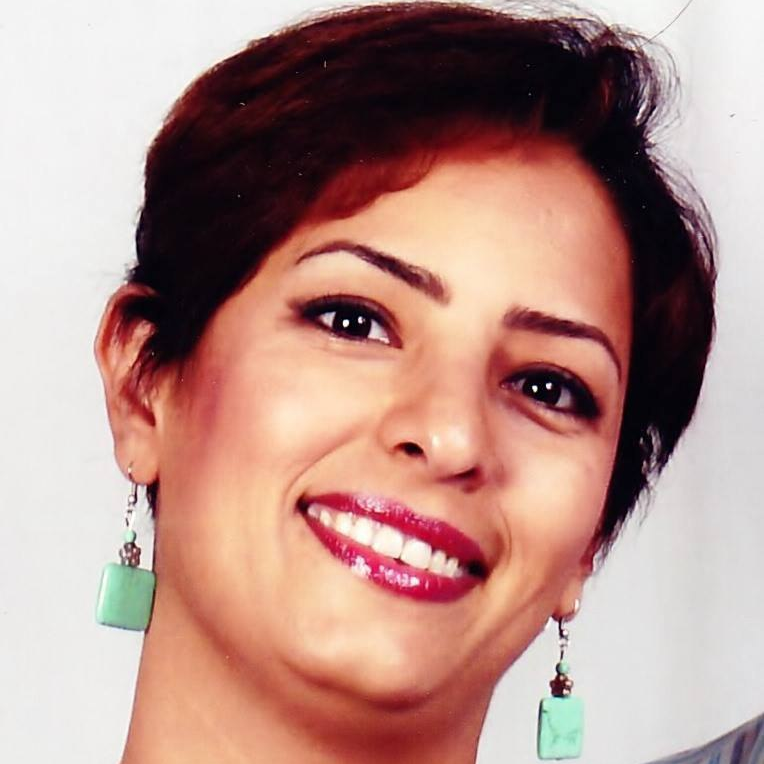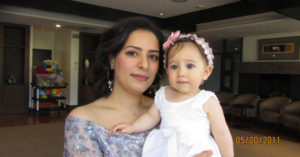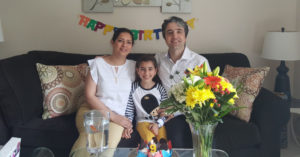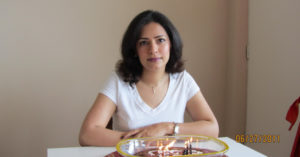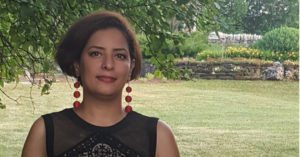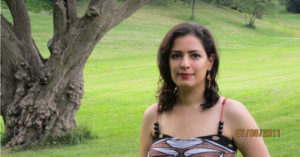Parisa Eghbalian
Parisa was the first child born to a Mazanderani family. Her mother, Mina, is a retired teacher and her father, Qasem, was a conservation officer. Parisa was born on June 26, 1978, in the small town of Sari in northern Iran. She later had two younger siblings: Amir and Parnian.
The outgoing little girl grew into a clam and quiet young lady. Having lived in Sistan Balouchestan and Minoudasht for some years, they moved back to Sari. She spent most of elementary school following her mother from one rural school to another. She skipped grade two, and later in life attended some of the most prestigious schools in Sari. Being a top student that she was, she ranked 300th in the national university entrance exam and was admitted to the dentistry university of Tabriz, many miles away from home.
“I don’t like to be scolded, I don’t like to get low marks, I don’t like to feel belittled. “
Although she claimed to never study during the semester, her marks were always high at university. She would dress well. She liked to be different; in her choice of clothing, in her subtle makeup, in the shoes she wore.
Parisa and Hamed met on November 30, 1999. They were classmates for 5 years and were drawn to each other from the early days. Any kind of relationship outside of marriage was frowned upon; so they kept their relationship a secret. Other than a few close friends and their parents nobody else was let to know this secret. There are many of love-letters left from those times, lots of handwritten notes bearing their longing and adoration for one another.
“What took me so long to tell you that I loved you? I regret delaying it until last minute, until that night that I proposed to you.”
They married just over a year later, on January 4, 2000. They graduated shortly after. Hamed writes the rest of the story as follows:
“We lived in Bandar-e-Gaz county for about a year. In the initial months, because I was trying to start my own dental practice, Parisa covered our rent. She worked in the Juybar county for her practicum. She had a strong work ethic. She worked diligently and honorably; to help the farmers, the working class, the poor families in deprived rural areas.
We were going to have a wedding which was canceled due to the sudden death of her cousin. We moved to Tehran shortly after. Parisa found work in Janat-Abad, north-west of Tehran. That was about the time we started thinking about immigration. We both started learning English. During the 7 years that we had our immigration application in process, we traveled a lot; to many places in Iran, many cities in Europe. Together, we danced at all our friends’ weddings. Together, we mourned every disaster that happened in Iran. We had been in Bam visiting just a week before the catastrophic earthquake hit the town. We had seen L’aquila before the earthquake destroyed it. We left Naghshe-Rostam speechless; perhaps also a little spooked to learn that was where the corpses were left for the vultures. Together we read books; we went to the movies; we watched plays.
We knew there would be no red carpet, no grand welcome for us in Canada. We did not expect that. When we came to this country, we had a tiny companion; Reera our six-month-old daughter.
We became licensed to practice in Canada in just over a year. Parisa ranked third in Canada in the exams that year. She also passed the practical exam successfully. Those were tough times, but we persevered. Parisa was accepted at her first job interview. We moved to the small town of Hanover where we called home for the next 4 years.
Parisa lost her father 6 years ago. This loss left such a deep impact on her that led to us moving back to Richmond Hill in Toronto.
We started a small dental practice in Aroura. Parisa managed the move. She was a strong, self-made, and capable woman who had the potential to direct several dental clinics someday.
She worked long hours; studied in her spare time and attended dental seminars everywhere in Canada and the United States. Meanwhile, she was the best mother I knew. She kept
well-informed about the world’s and local news. She was a women’s, children’s, and minority’s rights advocate. She knew the classic and modern literature and she never held back her opinions.
The fact that she never returned from her 12-day trip to Iran for her sister’s wedding is not acceptable to us. Her loss left a bride in sorrow, a mother in pain, and a brother heart-broken. Her loss left me in disbelief, left her friends and all those who knew her in disbelief.
Without her, life has no flavour. It has no joy. Without her, life is hollow. As if all the flowers in the garden were chopped off in the dark of the night. She had just gone to watch the garden and she was trapped by the beast.
I testify that in the past 20 years, I never heard her say a word of lie. I testify that she never uttered bad words about anyone, never wished bad on anyone. She had no enemies. She was a beautiful woman with modest dreams whose beauty and her dreams were shattered in those minutes of horror.
Today, Parisa and our daughter Reera, are resting in Elgin Mills Cemetery in the section 27, lot 1014, with all their joys, with all their bliss.
Many more loving words were left untold between us. A house by the lake, as she always dreamt about, was never bought. Reera was never sent to the university she hoped to attend. On January 8, 2020, all the future was taken away from us by the IRGC’s missiles, and I, as Parisa’s husband, the husband to the most beautiful woman on earth, seek justice for her death. I am all in on this journey.”
